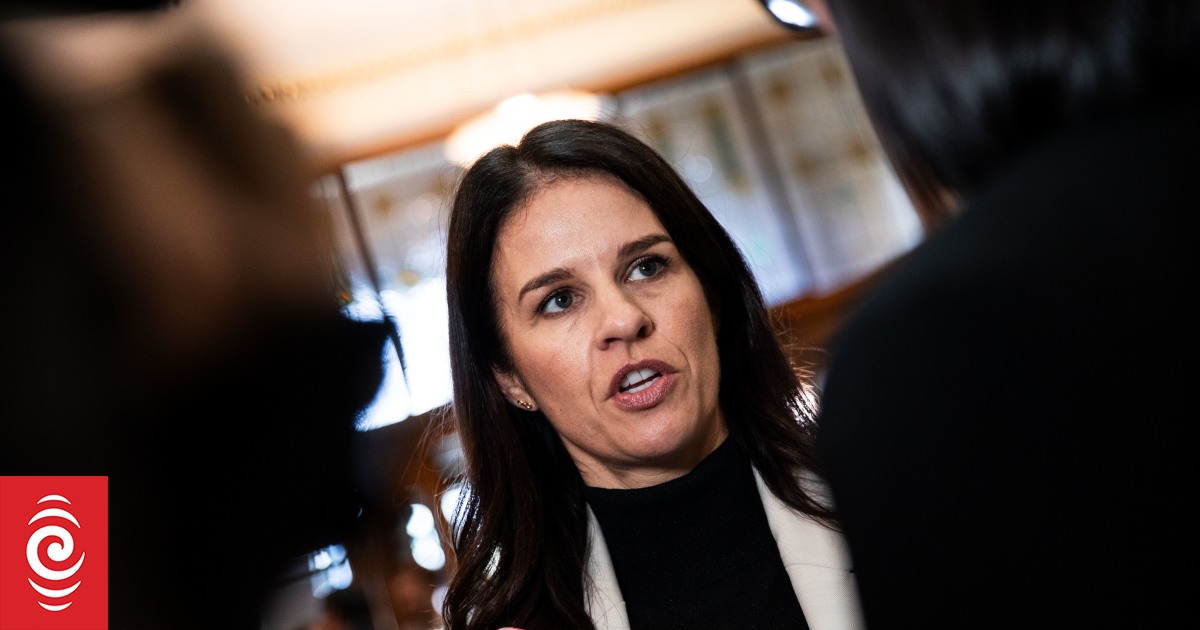Education Minister Erica Stanford
Photo: RNZ / Samuel Rillstone
The government has announced a number of new secondary school subjects and a new emphaisis on artificial intelligence it says will help prepare young people for the jobs of the future.
Education Minister Erica Stanford said those working on the changes will investigate having a new Year 13 subject on Generative AI “for later development”.
“With the rapid development of AI, students will also be able to learn about and use generative AI in a range of subjects. This may include learning about how digital systems work, machine learning, cybersecurity, and digital ethics.”
Stanford said the new subjects, being developed for the Years 11 to 13 curriculum, reflect the growing importance of science, technology, engineering and mathematics, often referred to as STEM.
She said the government was introducing new industry-led subjects to give students more choice.
These would include, primary industry, health and wellbeing services, outdoor education, automotive engineering, building and construction, infrastructure engineering, mechanical engineering, tourism and hospitality.
“Students will be able to specialise in areas such as earth and space science, statistics and data science, and electronics and mechatronics. There will also be a range of new specialist maths subjects including further maths.
“When our young people leave school, we want doors to open for them whether they’re going to tertiary study, learning a trade, or heading straight into work. These refreshed subjects will provide students with choice, purposeful pathways and opportunities for specialisation that set them up for success,” Stanford said in a statement.
It was vital students had access to “innovative and dynamic subjects” that would help the country’s future, she said.
Other new subjects include: civics, politics and philosophy, Pacific studies, Te Mātai i te Ao Māori and music technology.
Te Marautanga o Aotearoa will be resourced with a first ever detailed curriculum in te reo Māori as well as new subjects including new Tātai Arorangi (Māori traditional systems of Earth and Sky), Te Ao Whakairo (Māori carving) and Te Ao Māori subjects.
Phase-in over three years
The new subjects would be phased in starting with Year 11 students in 2028, then Year 12 students in 2029 and finally Year 13 students in 2030.
That gave the government just a few years to tackle a staffing shortage that principals have described as a crisis.
Stanford was adamant it could be done.
“Of course it is [possible], and I wouldn’t describe it as a crisis at all.” she said.
“We’ve got more students in training [to become teachers] than we’ve had in a very long time. A 28 percent increase in students studying secondary school teacher training.”
Chris Abercrombie
Photo: Supplied
Stanford explained that not all of the subjects would be covered at every school.
“As it exists now, not all schools do every subject,” she said. “They pick the subjects they’re able to offer, and that won’t change.”
But she noted that existing teachers might need to run additional classes.
“Many of these subjects will be taught by teachers already in the system,” she said.
“For example, there’s a new ‘journalism, media and communications’ subject. The teachers who already exist who teach media studies will likely teach that subject.”
Stanford hoped that the increased workload would be balanced by a flow of new teachers.
“It’s a bit of both. They may be doing additional subjects, or we may be having new teachers into the sector. It’s that combination of both, but we’ve got a long runway to get there.”
Post Primary Teachers Association president Chris Abercrombie said the government’s decision to release the list of secondary school subjects before the rest of the curriculum was putting the cart before the horse.
“It means that we have no idea, for example, of the prior learning that these Year 11 to 13 subjects will build on,” he said.
“We also would like to know what kind of support will be provided for the implementation of the new subjects in particular. We know from much experience that major changes succeed or fail depending on how well-resourced and supported the implementation of them is.”
Industry Skills Boards to develop the subjects
The Education Ministry would commission Industry Skills Boards to develop the subjects.
“These pathways will be industry led and tertiary aligned so they meet what is expected in the professional world, making staying at school relevant for every child, no matter what their career pathway. This will enable students to leave school with a secondary and a tertiary qualification. We’re having one integrated system where all subjects, whether ministry-led or industry-led, are equal,” Stanford said.
The peak bodies for teachers of both outdoor education and tourism courses previously told RNZ they feared the government’s overhaul of secondary school qualifications would downgrade them.
Education Outdoors NZ chief executive Fiona McDonald said the Industry Skills Board responsible for outdoor education had yet to be set up and would be poorly positioned to develop a school curriculum for outdoor education.
Sign up for Ngā Pitopito Kōrero, a daily newsletter curated by our editors and delivered straight to your inbox every weekday.

